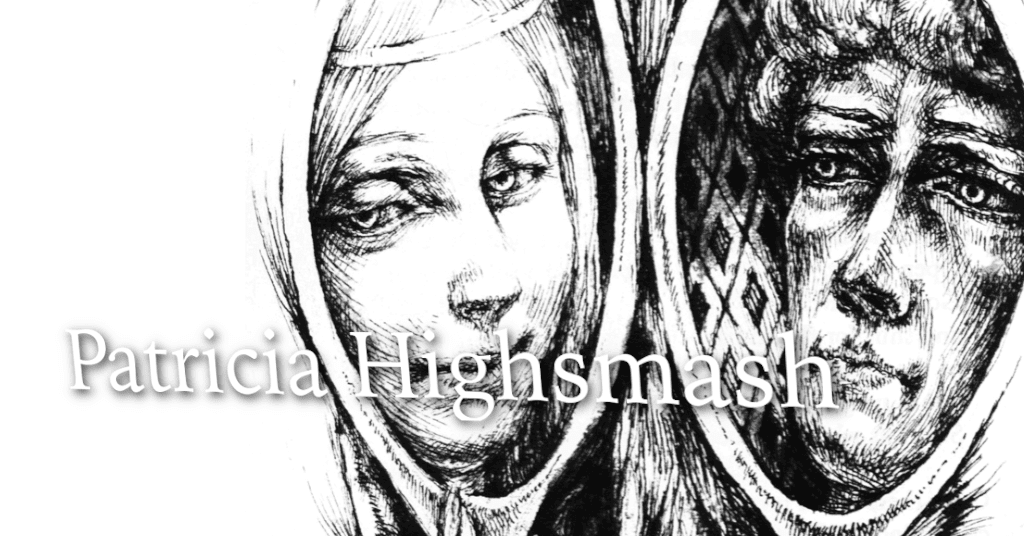Patricia Highsmash
One Part Doppelgänger
Transformations, Anne Sexton, Barbara Swan
by Travis Hedge Coke
I have not watched or read anything from Woody Allen in I do not know how long. I quit trying to keep abreast of JK Rowling even to counter her stauncher defenders, at some point. I can no longer read Warren Ellis’ work.
I still read and often ponder the contents and whole of Transformations, a book of thematically-unified poems and line art by collaborators, Anne Sexton and Barbara Swan. I know, on every page, even the ones which are solely Swan’s art, that Sexton abused her children, she engaged in many unsavory practices, that she could be – and was – violent, cruel, callous, and not always out of spite or vindictiveness, sometimes out of calculation.
Transformations is a brutal, tempestuous collection, even if you do not factor in Sexton’s abuses. Abuses, which her bipolar disorder and personal traumas do not absolve.
The word, “emolument,” comes from the Latin for, “to thoroughly grind.”
Transformations reworks a handful of the fairytales the Grimm Brothers anthologized, turning them on a modern lathe, examining them under contemporary lenses, for emotional and political content, for chance détournement; enticing out of them miasmic anxiety and puckish stabilization.
Barbara Swan did not illustrate Transformations, though that is how her work on several collaborations with Sexton, including the one which won the Pulitzer Prize, will be remembered. Her art inspired poems and new directions for Sexton and Sexton’s poetry inspired drawing and new approaches for Swan. A version of Transformations which isolated prose or visual art alone would be something not-Transformations.
Together, working separately in tandem, Swan and Sexton recreate Cinderella in
Or the nursemaid,
some luscious sweet from Denmark
who captures the oldest son’s heart.
From diapers to Dior.
That story.
Or a milkman who serves the wealthy,
eggs, cream, butter, yogurt, milk,
the white truck like an ambulance
who goes into real estate
and makes a pile.
and,
Neither has more weight, inside the book, and it is up to us to weigh them if we do. We praise and prize and choose text or image, line or line, we make our beds of their fragile, crawling, permanent efforts.
Even educational efforts really give us the morals our raising or our situation tell us we ought to find in there. We plumb for reaffirmation of a lesson we already have. In this way, life and song and picture and story are a sequence of affirmations reiterating almost exactly but not so exact as to always be the same, the slight mutability moving us further and further into an idiosyncratic understanding while texts and visuals and comics and poems and books and plays remain as they were except in retellings.
Transformations has a famous foreword, written by Kurt Vonnegut. It is funny to me, as it was funny to people then, a brief folksy yet academic anecdote offered to substantiate the collection. Probably not his intention, or desire, but almost certainly the job, and he does the job. It has a graph, references male poets, and uses James Joyce as ballast and contrast.
The two women who made Transformations do not need it, and Vonnegut seems to know that. It is in every anglophone edition of the book, but it is not part of the book.
A man, say,
has twelve children
and damns the next
at the christening ceremony.
God will not be the godfather
Transformations is a brutal, tempestuous collection, even if you do not factor in Sexton’s abuses. Abuses, which her bipolar disorder and personal traumas do not absolve. We plumb for reaffirmation of a lesson we already have. In this way, life and song and picture and story are a sequence of affirmations reiterating almost exactly but not so exact as to always be the same, the slight mutability moving us further and further into an idiosyncratic understanding while texts and visuals and comics and poems and books and plays remain as they were except in retellings.
If the French for fur was turned into the glass of Cinderella’s slipper by English transliteration, maybe, “je sui d’accord,” would become shoes of cord.
I still read and often ponder the contents and whole of Transformations, a book of thematically-unified poems and line art by collaborators, Anne Sexton and Barbara Swan, retelling Grimm’s fairy tales for their own accords.
